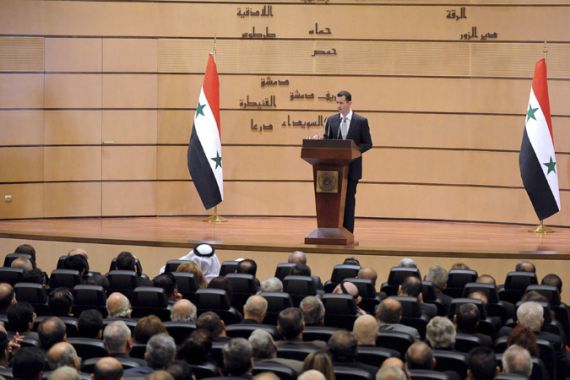Syrian leader blames ‘foreign interference’
Assad criticises Arab League’s actions but says Syria will not “close doors” to a solution if sovereignty is respected.

The Syrian president has made a defiant speech blaming foreign interference for the anti-government uprising in his country which began last March.
In a televised speech on Tuesday, he accused the Arab League of hypocrisy for lecturing Syria on democracy and reform. However, he said his country would not “close the doors” to an Arab-brokered solution to the crisis as long as it respected Syria’s sovereignty.
Assad claimed he never ordered anyone to open fire on anti-government protesters. However, opposition activists said at least 28 people were killed across the country on Tuesday alone as part of the government’s security crackdown.
Assad asked what right other Arab governments, including the absolute monarchies of the Gulf, had to lecture Syria about democracy or reform.
“The first parliament in Syria was in 1917. Where were they then?” he said.
“Their situation is like a doctor who smokes and recommends to his patient to give up smoking while he, the doctor, has a cigarette in his mouth.”
The Arab League suspended Syria and sent a team of monitors in late December to assess whether the government is abiding by its peace plan agreed to by Assad last month.
At a Security Council meeting in New York on Syria on Tuesday, delegates were informed by a UN official that up to 400 people had been killed since the regional body’s monitoring mission began – on top of an earlier UN estimate of more than 5,000 dead since March.
‘No orders to open fire’
Assad’s address at Damascus University was his first public speech since he agreed last month to the deployment of the Arab League monitors.
He said the unrest had inflicted a “heavy cost” and accused “foreign conspirators” of working to destabilise the country.
He also said that no orders had been given to security forces to open fire on civilians.
“There is no cover for anyone. There are no orders for anyone to open fire on any citizen,” Assad said, adding that “by law, nobody can open fire, except in self-defence”.
Assad said it had been his idea to send observers to Syria “to find out the truth”.
He also said he would not step down, claiming he still had the Syrian people’s support, despite months of anti-government protests across the country against his rule.
“When I leave office it will be by the will of the people,” he said.
Assad defended the government’s ban on most reporting by foreign media inside the country, saying that at the beginning of the unrest all media had been allowed to work freely.
“But fabrications from inside convinced us to put some control on this,” he said.
Al Jazeera is among many media organisations banned from reporting without restrictions from inside Syria.
Opposition reacts
Reacting to Assad’s speech, the Syrian National Council (SNC), the largest opposition umbrella group, called it an “incitement to violence” indicating “more criminal behaviour” by the government.
“There is incitement to violence, incitement to civil strife, some talks about sectarian divisions which the regime itself has fomented and encouraged,” Basma Qadmani, an SNC member, said in the Turkish city of Istanbul.
“Our concern today is that such a speech is quite indicative of the total dismissal by the regime of the international community.
“And that is an indication that we are going in the direction of more irresponsible and more criminal behaviour by the regime in the coming days and weeks.”
|
Journalist Nir Rosen discusses the situation in Syria
|
Qadmani also said Assad’s speech indicates that the government “is breaking up with the Arab League”.
“This is a turning point, a rupture with its Arab environment,” she said.
For his part, Assad, who has made repeated promises of reforms, said a new constitution would soon be put to a referendum, with a vote possible by March, followed by multi-party parliamentary elections within months.
“After legislation has been drawn up and a constitution… we will call a referendum… [maybe] in the first week of March.” he said. “Elections must be linked to a new constitution. They could be at the start of May.”
Assad urged Syrians to remain steadfast, telling them that “victory is near” and that outside forces had been unable to “find a foothold in the revolution that they had hoped for”.
He also pledged to hit back at so-called terrorists following a pair of deadly bombings in Damascus and spreading violence blamed on anti-government forces.
“There can be no let-up for terrorism – it must be hit with an iron fist,” Assad said. “The battle with terrorism is a battle for everyone, a national battle, not only the government’s battle.”
Not ‘totally uncompromising’
Speaking to Al Jazeera, Patrick Seale, author of several books on Syria, said that while Assad’s speech was tough, it was not “totally uncompromising”.
“He spoke of a new constitution, and putting it to a referendum, fresh elections, and that a new government would be formed,” Seale said.
“I would say that he remains very much in control. I wouldn’t say he was frightened, because the opposition is not in a position to topple him.”
Seale said that there was still a slice of the population who seemed to favour Assad. “It is not as if the whole country is against him,” he said. “The opposition, as brave as it is, hasn’t come up with a clear project or a clear leader.
“The problems are how to stop the killings, and how are the Syrians going to be able to live together after this blood-letting.”